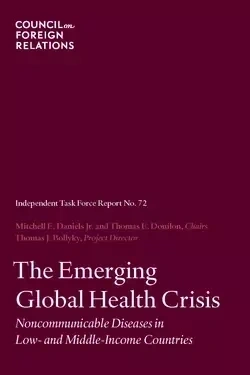
The Emerging Global Health Crisis
Noncommunicable Diseases in Low- and Middle-Income Countries

- Task Force Report
- Analysis and policy prescriptions of major foreign policy issues facing the United States, developed through private deliberations among a diverse and distinguished group of experts.
Rates of heart disease, cancer, diabetes, and other noncommunicable diseases (NCDs) in low- and middle-income countries are increasing faster, in younger people, and with worse outcomes than in wealthier countries. In 2013 alone, NCDs killed eight million people before their sixtieth birthdays in developing countries. A new CFR-sponsored Independent Task Force report and accompanying interactive look at the factors behind this epidemic and the ways the United States can best fight it.
The co-chairs of the Task Force are Mitchell E. Daniels Jr., Purdue University president, former Indiana governor, and former Office of Management and Budget director, and Thomas E. Donilon, distinguished fellow at CFR and former national security advisor to President Barack Obama. Thomas J. Bollyky, CFR senior fellow for global health, economics, and development, directed the project. The bipartisan Task Force, CFR's first devoted to a global health issue, is composed of a distinguished group of experts that includes former government officials, scholars, and others.
More on:
NCDs will affect U.S. interests because of their human, economic, and strategic consequences. "More patients will get sick, suffer longer, require more medical care, and die young. Given the scale of these trends, the results will reverberate," the Task Force warns. It is projected that the NCD epidemic will inflict $21.3 trillion in losses in developing countries over the next two decades—a cost nearly equal to the entire economic output of those countries in 2013. "These economic consequences will undercut potential U.S. trade partners and allies and may reduce domestic support for governments of U.S. strategic interest."
The Task Force says the United States and like-minded partners can help developing countries meet the NCD challenge at relatively modest cost and "slow the rise of this epidemic, lessen its worst effects, and help provide national governments with the time and technical assistance needed to tackle this emerging crisis sustainably on their own."
The U.S. government should take two immediate steps, the Task Force says: examine its global health priorities and spending and ensure their continued effectiveness; and convene governments and other potential partners from around the world to develop a plan for collective action on NCDs in low- and middle-income countries.
The Task Force encourages the United States to focus on the NCDs and risk factors most prevalent among the working-age poor in developing countries. Low-cost interventions are available and should be integrated into existing U.S. global health efforts. Based on these criteria, the Task Force maintains that:
In the short term U.S. leadership would have a significant effect on cardiovascular disease, tobacco control, liver cancer, and cervical cancer.
"Low-cost, prevention-based solutions exist for each challenge and the United States is in the position to help local governments implement them."
More on:
In the medium term U.S. leadership would make a tremendous difference to address diabetes and treatable and curable cancers, such as leukemia and breast cancer.
"The Task Force has identified several NCD challenges for which effective interventions are widely used in the United States and other high-income countries, but not yet sufficiently low cost or usable in low-infrastructure settings . . .With U.S. leadership, more population and implementation research, and collaboration with private sector and philanthropic partners, progress on adapting these interventions for cost-effective, low-infrastructure use is foreseeable in the near term."
U.S. collaboration with developing countries and the private sector may help ameliorate poor diets and nutrition, physical inactivity, and obesity. It could also help integrate mental health into primary care and provide low-cost chronic care programs and technologies.
"There is no long-term treatment solution to the challenge of NCDs. Only prevention can reduce the burden of these diseases and lower their associated health-care costs to sustainable levels. This is true in the United States, but particularly so for developing countries with limited resources."
Read the Task Force report, The Emerging Global Health Crisis: Noncommunicable Diseases in Low- and Middle-Income Countries. See also an annex with research methodology and profiles of nearly fifty priority countries.
Explore the online interactive based on the Task Force.
Read the accompanying op-ed by Mitchell E. Daniels Jr., Thomas E. Donilon, and Thomas J. Bollyky.
This project is made possible in part through generous support from Bloomberg Philanthropies.
Professors: To request an exam copy, contact [email protected]. Please include your university and course name.
Bookstores: To order bulk copies, please contact Ingram. Visit https://ipage.ingrambook.com, call 800.234.6737, or email [email protected]. ISBN: 978-0-87609-616-1
In the News
Chronic Diseases Are Killing More in Poorer CountriesNY Times
Noncommunicable Diseases Are the Leading Cause of Death in Low- and Middle-Income CountriesThe Asco Post
Cancer Care in Low-Resource Areas: Some Improvements Over the Years, but Serious Problems RemainThe Asco Post
NIH Aims to Increase Collaboration on Chronic DiseasesCouncil on Foreign Relations Press
 Online Store
Online Store
